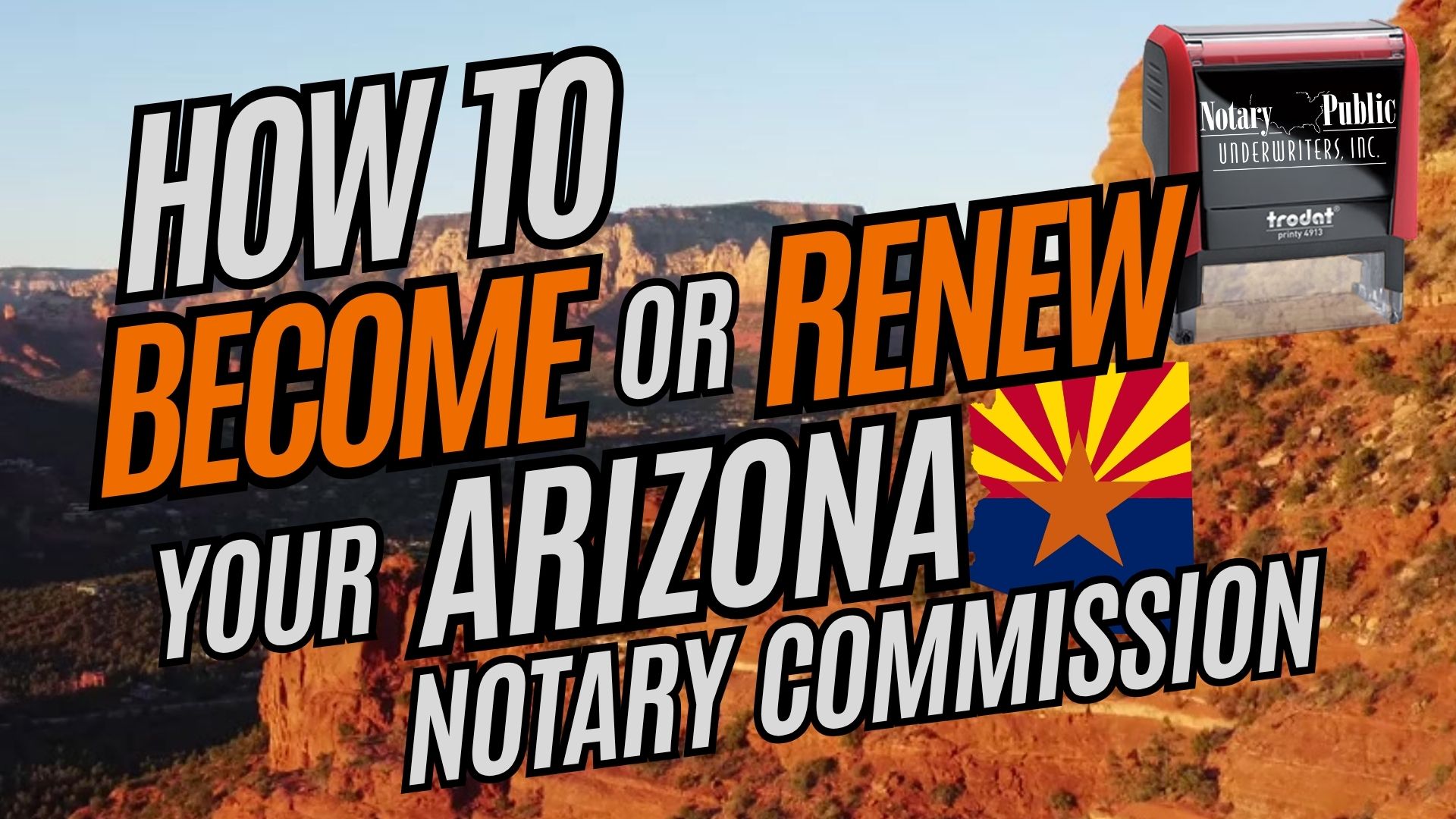How to Become a Notary in Arizona
What Are the Requirements to Become a Notary in Arizona?
Eligibility
To become a notary in Arizona, you must meet the following requirements:
- Be at least 18 years old
- Be a resident of Arizona
- Be able to read and write English
- Be a citizen or legal permanent resident of the United States
- Not have a conviction for a felony unless civil rights have been restored, or a conviction of a lesser offense involving moral turpitude or of a nature that is incompatible with the duties of a notary public
Exam
Beginning July 1, 2025, all new and renewing Arizona notary applicants must take and pass a mandatory, proctored exam. The exam consists of 45 basic questions, is open book exam, and must be completed within 60 minutes. To learn more about the exam, click here.
Ready to Become a Notary?
GET STARTED
How to Apply to Become a Notary in Arizona
If you meet the requirements to become a notary in Arizona, follow the steps below to apply for your notary commission:
Step 1: Order Your Arizona Notary Public Bond & Supplies.
As part of the application process, you must obtain a $5,000 surety bond, also known as a notary bond, from a bonding agency such as Notary Public of America. This bond is intended to protect the public from any financial loss caused by notarial misconduct.
When you visit our Become a Notary page, you’ll notice that all of our packages include the notary bond, a notary stamp and a record book—ensuring you don't forget the state-mandated items.
Next, you will be directed to provide information in our online application process to confirm your eligibility for an Arizona notary commission and allow us to fulfill your order. After completing this information, you will customize your notary package, by selecting the case color of your notary stamp, and adding any additional supplies you need.
Although not required by law, it's a good idea to invest in a notary E&O insurance. Many notaries confuse an E&O policy with the notary bond, but they are entirely different products. The notary bond protects the public; if a claim is made against your bond, you must repay it. On the other hand, Notary E&O insurance protects you, the notary, from financial liability for unintentional mistakes or oversights, up to the policy limit. There is no deductible, and you are not required to repay it. Without this coverage, you would be responsible for all fees or expenses related to defending yourself.
At the end of checkout, your notary bond (issued in duplicate, per the Secretary of State, one copy to accompany your application, and one for your records.) will be available for download. You will need it for the next step.
Step 2: Complete the Bond & Oath of Office.
If you used our online application process, you should have already downloaded the bond. If not, log in to your account and download it from the "Notary Bond" tab. Remember your bond is issued in duplicate, per the Secretary of State, one copy to accompany your application, and one for your records. BOTH must be notarized before applying with the Secretary of State. Sign both Bonds at the Red X. In the presence of a notary public, sign the Oaths of Office at the Red X. Have the notary public sign at the double Red XX, place their seal and expiration on each Oath of Office. Your name must match on the application and bond or it may result in delays.
Step 3: Complete the Exam.
Visit the Secretary of State's website and scroll to click on Notary Exam Registration. Follow the instructions to purchase and start your state required exam. You may use the Notary Public Reference Manual as a study guide.
Once you pass the exam, you will receive your score via email that includes your candidate ID number. You will need your candidate ID number during the next step.
Step 4: Complete the Notary Public Application.
Complete the notary application through the Secretary of State’s online portal. During this process you will be asked for your candidate ID number. Upon completion, you will need to print and sign the application. Please note that the signatures on the application and bond must be identical.
Step 5: File Your Paperwork.
File your original signed notary application, bond and $43 filing fee with the Secretary of State. Mail this to:
Secretary of State
Attn: Notary Dept.
1700 W. Washington Street, Fl. 7
Phoenix, AZ 85007-2808
Step 6: Receiving Your Order.
Once you receive your notary commission certificate, email a copy of it to This email address is being protected from spambots. You need JavaScript enabled to view it.. Upon receipt of your commission certificate, we will manufacture your notary supplies and ship them within three business days. Once your supplies arrive, you may begin performing your duties as a notary!
Watch our YouTube video:
How Much Does It Cost to Become a Notary in Arizona?
The $5,000 notary bond is $25 with Notary Public of America, and the filing fee is $43. You will also need to purchase a notary stamp so that you can carry out your duties. These vary in price depending on the style you like. Below is a breakdown of our most popular package for becoming a notary. Please note that the state filing fee is not included.
| Item | Cost |
| $5,000 Notary Bond | $25 |
| Rectangular Notary Stamp | $24 |
| Notary Public Record Book | $10 |
| $30,000 Notary E&O Insurance | $75 |
| Shipping & Handling | $12.95 |
| Total Cost | $146.95 plus tax |
Arizona Notary Public FAQs
What Is a Notary Bond?
All Arizona applicants must obtain a $5,000 surety bond, also known as a notary bond, from an approved bonding agency such as Notary Public of America. This bond protects the public from financial loss caused by notarial misconduct.
A notary bond, also called a surety bond, is similar to an insurance policy. However, the key distinction is that the bond protects the public (whoever needs the document notarized) and not the actual notary.
To protect yourself, you also can look into purchasing Errors and Omissions Insurance (“E&O”). E&O policies protect you, the notary, should someone make a claim against you. It is not mandatory to have E&O insurance when applying.
This distinction is hugely important because if someone makes a claim against your bond, you, the notary, must repay the difference back to the surety company. Similarly, if you are taken to court, a judge can hold you to unlimited liability. Simply because you are bonded for $5,000 doesn't mean you will not be expected to repay more than $5,000.
How Do I Obtain a Notary Bond in Arizona?
Visit our Become a Notary page to purchase the notary bond and other state-required items.
Not a new applicant? Visit our Renew Commission page!
I Have Been Convicted of a Felony in the Past. Does That Disqualify Me From Becoming an Arizona Notary Public?
No. If you have been convicted of a felony you must provide an explanation of the circumstances involving the charge(s), along with court documentation showing the original charge(s), and court order showing your civil rights have been restored.
How Long Does It Take to Become a Notary in Arizona?
The overall timeframe can vary depending on how quickly you complete each step. Once the state receives your notary application, the process typically takes 4 to 6 weeks.
What Do I Need to Know About the Arizona Notary Exam?
Starting July 1, 2025, all new and renewing Arizona notaries must pass a mandatory exam before applying for or renewing their commission. The test is open-book, has 45 questions, a 60-minute time limit, and requires a minimum score of 80% to pass.
You can take the exam as early as May 1, 2025. It’s administered by Prometric (online or in-person), and requires a passing score of 80% within 60 minutes.
Study the Arizona Notary Public Reference Manual to prepare. If you fail, you must wait 30 days to retake it, and one year after a third failed attempt.
Where Can I Perform Notarizations?
An Arizona notary can perform notarial acts anywhere within the state’s borders.
Can I Notarize Any Document?
No. As a notary, you are only authorized to perform notarizations that include proper notarial wording—such as an acknowledgment, jurat, copy certification, or oath/affirmation.
You can find examples and detailed explanations of these types of notarial acts in the Notary Public Reference Manual.
Can I Let My Notary Commission Expire Without Taking Any Action?
If you no longer wish to be a notary, you have two options:
1. Resign Your Commission (Before It Expires)
If you are still within your term, you may choose to resign your commission. This is not a permanent resignation—you may apply again in the future. When resigning, you must surrender your journal, seal(s), and all other notary materials to the Secretary of State’s office within three (3) months of your resignation date or you may be assessed a $50-$500 fine. A.R.S. 41-317(A). The state will retain your records and be responsible for responding to any public record requests on your behalf.
This is the course of action recommended by the Secretary of State.
2. Let Your Commission Expire (Without Renewal)
If you decide not to renew your commission when it expires, you must send your journal, seal, and all other notary records to the Secretary of State’s office within three (3) months of your commission expiration date. Failure to do so may result in a fine ranging from $50 to $500 (A.R.S. § 41-317(A)). Unlike with a resignation, if you let your commission expire, you will be responsible for responding to any public record requests related to your notarial acts.
The Secretary of State does not recommend this option.
How Long Does an Arizona Notary Commission Last?
An Arizona notary commission is valid for four years. To maintain your status as a notary, you will need to renew your commission before it expires.
How Do I Renew My Notary Commission in Arizona?
To renew your notary commission in Arizona, you must meet the same eligibility requirements, obtain a new notary bond and supplies, complete the exam again and reapply. Begin the renewal process at least three months before your current commission expires to allow enough time to take the exam and avoid potential delays.
Prepared to take the next step?
Start right with the professional notary package.


